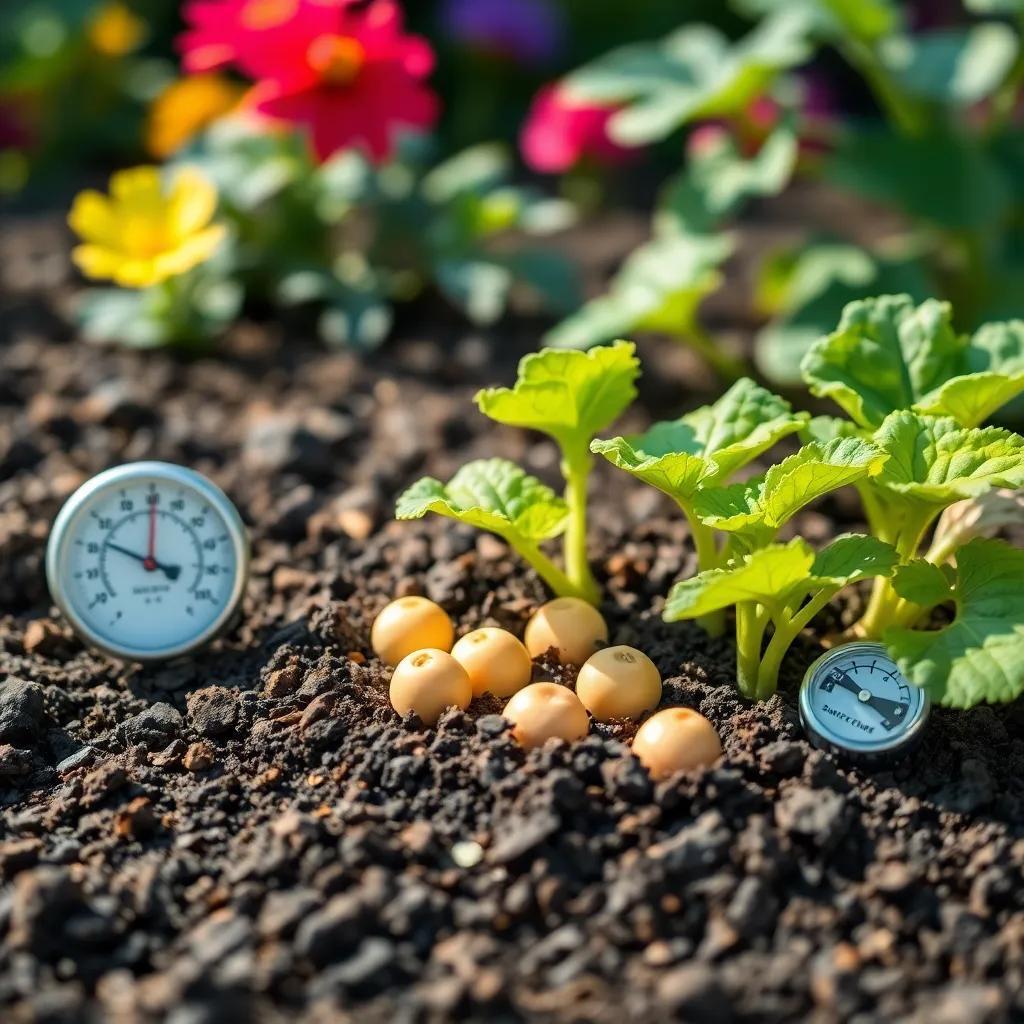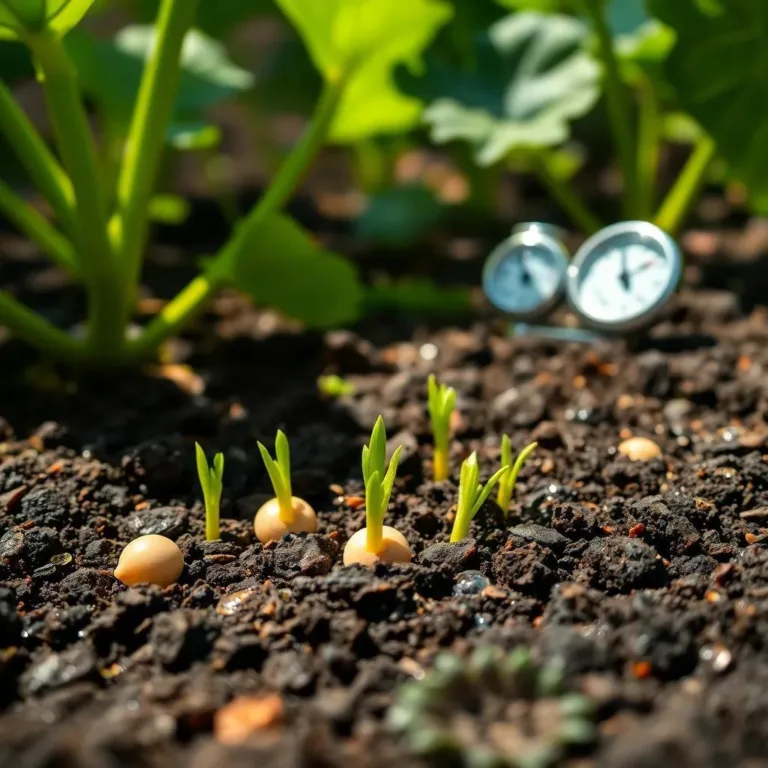Are you ready to grow some delicious butternut squash in your garden? In this article, I’ll share everything you need to know about how long it takes for butternut squash seeds to germinate and the best tips to help them sprout quickly! Let’s dig into the fun world of gardening and ensure your squash plants thrive!
Factors That Influence Butternut Squash Germination Time
Growing butternut squash can be a fun adventure, but did you know that several factors can influence how quickly your seeds sprout? Let’s dig into these, so you can give your plants the best chance to thrive!
- Seed Quality: Not all seeds are created equal! Using fresh, high-quality seeds can make a big difference. If you have seeds that are old or damaged, they might not germinate well. So, always check the package date and pick seeds from a trusted source!
- Soil Temperature: Butternut squash seeds love warm soil! Aim for a cozy range of 70-85°F (21-29°C). If the soil is too cold, your seeds might take their sweet time. A seedling heat mat can help keep things toasty.
- Moisture Level: Think of a sponge – it needs to be wet but not dripping! Keep your soil evenly moist. If it’s too dry, your seeds will struggle. But if it’s too wet, they could rot. So, spray a little water regularly to keep them happy!
- Light Exposure: Guess what? Butternut squash seeds prefer to germinate in darkness! Cover them lightly with soil or a moisture-retaining material. Once they sprout, though, they’ll need plenty of sunlight to grow strong!
- Planting Depth: Plant your seeds about 1 inch (2.5 cm) deep. Too shallow, and they might dry out; too deep, and they could get stuck in the soil. Finding that perfect depth is important for a good start!
By keeping these factors in mind, you can create the perfect conditions for your butternut squash seeds to sprout and grow! Isn’t that exciting? I can almost taste those delicious squashes already!
Ideal Conditions for Successful Germination
Now that we know what affects germination, let’s chat about the ideal conditions you can create for your seeds. Setting the stage just right will help your squash plants thrive like the stars they are!
- Temperature: As I mentioned earlier, keeping the soil between 70-85°F (21-29°C) is a must. You can use a thermometer to check this. If it’s a bit chilly outside, consider bringing your seed trays indoors or using a heat mat.
- Moisture: Water is life for your seeds! Keep the soil consistently moist but not soggy. I like to use a spray bottle for gentle watering. This way, I can control the moisture without drowning them!
- Soil Type: The right soil matters too! Aim for well-draining soil – something like sandy loam is perfect. This allows water to flow while keeping enough moisture for the seeds. Trust me, squashes don’t want to sit in a puddle!
- pH Level: Butternut squash prefers soil with a pH level of 6.0 to 7.0. You can get a simple soil testing kit to check this. If your soil isn’t in this range, you might need to adjust it with some additives.
- Light Exposure: Remember, seeds like darkness, but once they sprout, they need 12-14 hours of light a day. Keep them near a sunny window or use grow lights to help them grow strong and happy!
By creating these ideal conditions, you’re setting your butternut squash seeds up for germination success! Just imagine the joy of seeing those little sprouts peeking out of the soil! It’s a gardening win, for sure! Happy planting!

Average Germination Time for Butternut Squash Seeds
So, you want to know how long it takes for butternut squash seeds to pop up, right? Well, the average germination time for these little guys is typically around 7 to 14 days, depending on their environment. Isn’t that exciting? It’s like waiting for a surprise party in your garden!
Here’s what to expect during this period:
- Days 1-3: After planting, you might start to feel impatient. Don’t worry! This is the stage where the seeds are soaking up moisture and warming up. They are getting ready to sprout!
- Days 4-7: If you’ve given them the right conditions—warm soil, moisture, and a bit of darkness—this is when you should begin to see some action! Tiny roots will start to emerge as they break through the soil.
- Days 8-14: By now, you should see those cute little seedlings peeking out! However, remember that some seeds might take a bit longer, and that’s okay. Every seed moves at its own pace, kind of like waiting for your mail on a Sunday.
If your seeds haven’t sprouted by day 14, don’t lose hope. Sometimes they just need a little more love in terms of warmth or moisture. Just keep checking on them, and soon enough, you’ll be on your way to a fantastic butternut squash harvest!
Tips to Accelerate Butternut Squash Germination
If you’re as impatient as I am when waiting for those seeds to sprout, here are some fantastic tips to speed up butternut squash germination! Trust me, these tricks can make a world of difference.
- Pre-soak the seeds: Give those seeds a nice soak in water for 12-24 hours before planting. This helps soften the seed coat and speeds up germination! Just like hydrating before a big race!
- Scarification: If you notice your seeds have a tough outer shell, consider gently nicking or sanding them. This can help water penetrate more easily, leading to faster growth. Just remember to be gentle—no need for a seed spa day!
- Maintain warm soil: Use a seedling heat mat to keep the soil at the perfect temperature. That cozy warmth is like a blankie for your seeds—it helps them feel comfy and ready to pop up!
- Perfect moisture: Keep the soil consistently moist. You don’t want it dry as a desert or soggy like a sponge. A spray bottle can help provide even moisture without overdoing it!
- Provide adequate light: Once your seedlings break through the surface, they’ll be craving light! Make sure they get 12-14 hours of sunlight daily, or provide some grow lights if you’re starting them indoors.
These tips can help you get those seeds sprouting in no time! Just remember, patience is still key, but with a little extra care, you can accelerate the wait for your delicious harvest.
Common Issues and How to Troubleshoot Germination Problems
Sometimes, even with the best care, things can go awry during germination. But don’t worry; I’m here with some common issues and simple solutions to help you troubleshoot those pesky problems!
- Slow or uneven germination: If some seeds are taking forever to sprout, check your soil’s temperature and moisture. If it’s too cold or too dry, that’s a recipe for delay! Adjusting the temperature and giving them a little spray of water can help.
- Poor seed quality: If your seeds aren’t sprouting at all, it might be time to blame the seeds! Using fresh, high-quality seeds is crucial. If they’re old or damaged, replace them with new ones for better success.
- Damping-off disease: This sneaky fungal villain can attack young seedlings, causing them to wilt or rot at the base. Prevent this by using sterilized soil and giving seedlings good air circulation. If you spot damping-off, remove the affected seedlings immediately!
- Pest damage: Watch out for those garden bandits! Slugs, snails, or cutworms love young seedlings. Use natural pest control methods, like diatomaceous earth or physical barriers, to keep your plants safe!
- Leggy seedlings: If your seedlings are stretching and looking spindly, they need more light. Make sure they’re getting enough direct sunlight or set them up with grow lights to help them grow strong.
By keeping an eye out for these common issues, you can tackle problems before they get too serious, helping your butternut squash seedlings grow healthy and strong. Remember, gardening is all about learning, so don’t get discouraged! Each challenge is a chance to become a better gardener!

